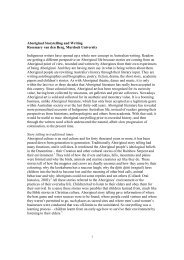Gallipoli, Kokoda and the Making of National Identity - [API] Network
Gallipoli, Kokoda and the Making of National Identity - [API] Network
Gallipoli, Kokoda and the Making of National Identity - [API] Network
You also want an ePaper? Increase the reach of your titles
YUMPU automatically turns print PDFs into web optimized ePapers that Google loves.
Hank Nelson<br />
for <strong>the</strong> civilians, where <strong>the</strong>y were <strong>the</strong> dominant force <strong>and</strong> where <strong>the</strong>y decided <strong>the</strong><br />
tactics used. In fact, until near <strong>the</strong> end Australian troops, <strong>and</strong> <strong>the</strong> Papuan infantry<br />
battalion <strong>and</strong> Royal Papuan Constabulary comm<strong>and</strong>ed by Australians, were <strong>the</strong><br />
only allied ground forces. In so many o<strong>the</strong>r major battles Australians can assume<br />
that any incompetent organisation or leadership was <strong>the</strong> fault <strong>of</strong> <strong>the</strong>ir allies, <strong>the</strong><br />
bravery <strong>and</strong> ingenuity <strong>of</strong> <strong>the</strong> Australian troops reflected Australian virtues. At<br />
<strong>Kokoda</strong> <strong>the</strong> long retreat <strong>and</strong> advance through <strong>the</strong> Owen Stanleys were Australian<br />
by direction <strong>and</strong> action. 14 The Australians not only fought on Australian territory<br />
but for Australia. When <strong>the</strong> Japanese reached Ioribaiwa in September <strong>the</strong>y could<br />
catch glimpses <strong>of</strong> Port Moresby, less than thirty miles away by direct line. At Port<br />
Moresby were <strong>the</strong> airstrips that would have brought <strong>the</strong> Japanese aircraft within<br />
easy range <strong>of</strong> eastern Australia.<br />
<strong>Kokoda</strong> was a turning point battle in a world war. The Japanese had been<br />
defeated a few days earlier at Milne Bay but <strong>Kokoda</strong> was a much more significant<br />
moment in <strong>the</strong> halting <strong>and</strong> <strong>the</strong>n reversing <strong>of</strong> <strong>the</strong> Japanese southward advance. It is<br />
true that <strong>the</strong>re was no dramatic final conflict at Imita Ridge: <strong>the</strong> Japanese were<br />
ordered to withdraw by <strong>the</strong>ir own distant comm<strong>and</strong>ers. But <strong>the</strong>se were Japanese<br />
troops exhausted after nearly two months <strong>of</strong> fighting to <strong>Kokoda</strong> <strong>and</strong> through <strong>the</strong><br />
Owen Stanleys.<br />
If <strong>the</strong> term ‘<strong>Kokoda</strong>’ is taken to encompass all <strong>the</strong> fighting from <strong>the</strong> l<strong>and</strong>ings at<br />
Buna <strong>and</strong> Gona in July to <strong>the</strong> final destruction <strong>of</strong> <strong>the</strong> Japanese with <strong>the</strong>ir backs to<br />
<strong>the</strong> sea six months later, <strong>the</strong>n some 12,000 Japanese, 2,165 Australians, 671 Americans<br />
<strong>and</strong> an unknown number <strong>of</strong> Papua New Guinean villagers, carriers <strong>and</strong> soldiers (but<br />
less than 500) died. 15 For Australians, <strong>the</strong>se are <strong>the</strong> statistics <strong>of</strong> a major battle in <strong>the</strong><br />
second world war.<br />
It was an unusual battle in that <strong>the</strong> militia, <strong>the</strong> ‘chocos’, did much <strong>of</strong> <strong>the</strong> early<br />
fighting. Later <strong>the</strong> AIF <strong>and</strong> militia fought side by side. The militia, many <strong>of</strong> <strong>the</strong>m<br />
called up as eighteen <strong>and</strong> nineteen year olds for home defence, had <strong>the</strong>n volunteered<br />
(or in some cases were ‘volunteered’) for service in Papua. The militia, young,<br />
briefly trained <strong>and</strong> going into action for <strong>the</strong> first time with a sprinkling <strong>of</strong> first world<br />
war diggers gave <strong>the</strong> Australians on <strong>the</strong> <strong>Kokoda</strong> trail a continuity with <strong>the</strong> past but<br />
certainly made <strong>the</strong>m different from <strong>the</strong> selected volunteers for overseas service<br />
that made up <strong>the</strong> AIF.<br />
There will always be some controversy among Australians about how <strong>the</strong> <strong>Kokoda</strong><br />
campaign was directed <strong>and</strong> about <strong>the</strong> performance <strong>of</strong> some troops. Two senior<br />
Australian <strong>of</strong>ficers, Brigadier A.W. Potts <strong>and</strong> Lieutenant-General S.F. Rowell, were<br />
both unjustly sacked by those who did not know what was going on or were trying<br />
to deflect blame from <strong>the</strong>mselves. The 21st brigade that had fought so desperately<br />
<strong>and</strong> effectively in retreat was told by <strong>the</strong>ir comm<strong>and</strong>er-in-chief, Thomas Blamey at<br />
Koitaki soon after <strong>the</strong>y came out <strong>of</strong> action that <strong>the</strong> ‘rabbit that ran away was <strong>the</strong><br />
rabbit that got shot’. It left <strong>the</strong>m ‘white with rage’ at <strong>the</strong> incomprehension <strong>and</strong><br />
insensitivity for what <strong>the</strong>y had done <strong>and</strong> seen <strong>and</strong> <strong>the</strong> disrespect for <strong>the</strong>ir dead. 16<br />
Dudley McCarthy in his comments on <strong>the</strong> 53rd battalion makes what may be <strong>the</strong><br />
harshest criticism in <strong>the</strong> <strong>of</strong>ficial history <strong>of</strong> any Australian battalion. It is said to have<br />
been a ‘badly trained, ill-disciplined <strong>and</strong> generally resentful collection <strong>of</strong> men’ on<br />
arrival in Papua <strong>and</strong> senior <strong>of</strong>ficers are quoted condemning it as unreliable in battle. 17<br />
154


![Gallipoli, Kokoda and the Making of National Identity - [API] Network](https://img.yumpu.com/31766380/7/500x640/gallipoli-kokoda-and-the-making-of-national-identity-api-network.jpg)
![Dream and Nightmare in William Gibson's ... - [API] Network](https://img.yumpu.com/49298598/1/184x260/dream-and-nightmare-in-william-gibsons-api-network.jpg?quality=85)

!['Fuck All Editors': The Ern Malley Affair and Gwen ... - [API] Network](https://img.yumpu.com/42446228/1/184x260/fuck-all-editors-the-ern-malley-affair-and-gwen-api-network.jpg?quality=85)
![Polona Petek - [API] Network](https://img.yumpu.com/40542952/1/190x245/polona-petek-api-network.jpg?quality=85)
![to download as a PDF. - [API] Network](https://img.yumpu.com/35170825/1/184x260/to-download-as-a-pdf-api-network.jpg?quality=85)
![Edward Koiki Mabo: The Journey to Native Title - [API] Network](https://img.yumpu.com/33197148/1/184x260/edward-koiki-mabo-the-journey-to-native-title-api-network.jpg?quality=85)
![Indigenous Knowledge and Pharmaceuticals - [API] Network](https://img.yumpu.com/24108846/1/184x260/indigenous-knowledge-and-pharmaceuticals-api-network.jpg?quality=85)
![Ferals: Terra-ism and Radical Ecologism in Australia - [API] Network](https://img.yumpu.com/13809010/1/184x260/ferals-terra-ism-and-radical-ecologism-in-australia-api-network.jpg?quality=85)
![Big Chief Little Wolf: Wrestling, Radio and Folklore in ... - [API] Network](https://img.yumpu.com/12204748/1/184x260/big-chief-little-wolf-wrestling-radio-and-folklore-in-api-network.jpg?quality=85)
![Dark Tourism and the Celebrity Prisoner - [API] Network](https://img.yumpu.com/4348795/1/184x260/dark-tourism-and-the-celebrity-prisoner-api-network.jpg?quality=85)